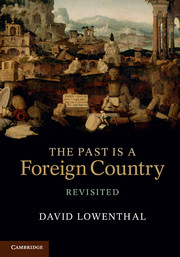Introduction
Published online by Cambridge University Press: 05 November 2015
Summary
The past is everywhere. All around us lie features with more or less familiar antecedents. Relics, histories, memories suffuse human experience. Most past traces ultimately perish, and all that remain are altered. But they are collectively enduring. Noticed or ignored, cherished or spurned, the past is omnipresent. ‘What is once done can never be undone … Everything remains forever’, wrote Václav Havel, ‘somewhere here’. The past is not simply what has been saved; it ‘lives and breathes … in every corner of the world’, adds a historian. A mass of memories and records, of relics and replicas, of monuments and memorabilia, sustains our being. We efface traces of tradition to assert our autonomy and expunge our errors, but the past inheres in all we do and think. Residues of bygone lives and locales ceaselessly enrich and inhibit our own. Awareness of things past comes less from fact finding than from feeling time’s impact on traits and traces, words and deeds of both our precursors and ourselves. To know we are ephemeral lessees of age-old hopes and dreams that have animated generations of endeavour secures our place – now to rejoice, now to regret – in the scheme of things.
Ever more of the past, from the exceptional to the ordinary, from remote antiquity to barely yesterday, from the collective to the personal, is nowadays filtered by self-conscious appropriation. Such all-embracing heritage is scarcely distinguishable from past totality. It includes not only what we like or admire but also what we fear or abominate. Besides its conscious legacies, the past’s manifold residues are embedded in our minds and muscles, our genes and genres de vie. Of passionate concern to all, the ‘goodly heritage’ of Psalm 16 becomes ‘the cuckoo in the historian’s nest’, purloining the progeny of Clio, the muse of history.
- Type
- Chapter
- Information
- The Past Is a Foreign Country – Revisited , pp. 1 - 22Publisher: Cambridge University PressPrint publication year: 2015



